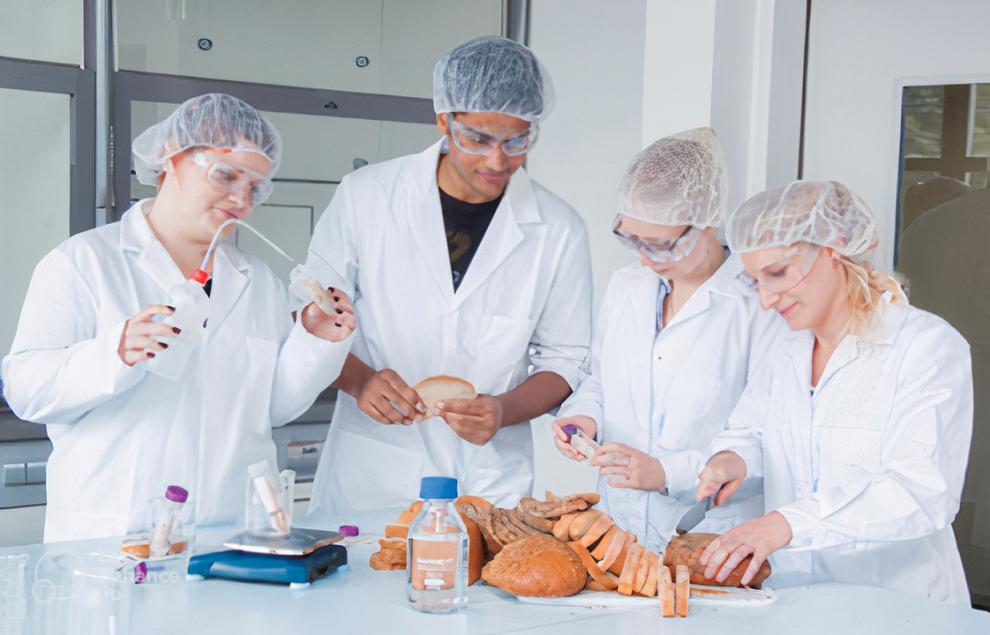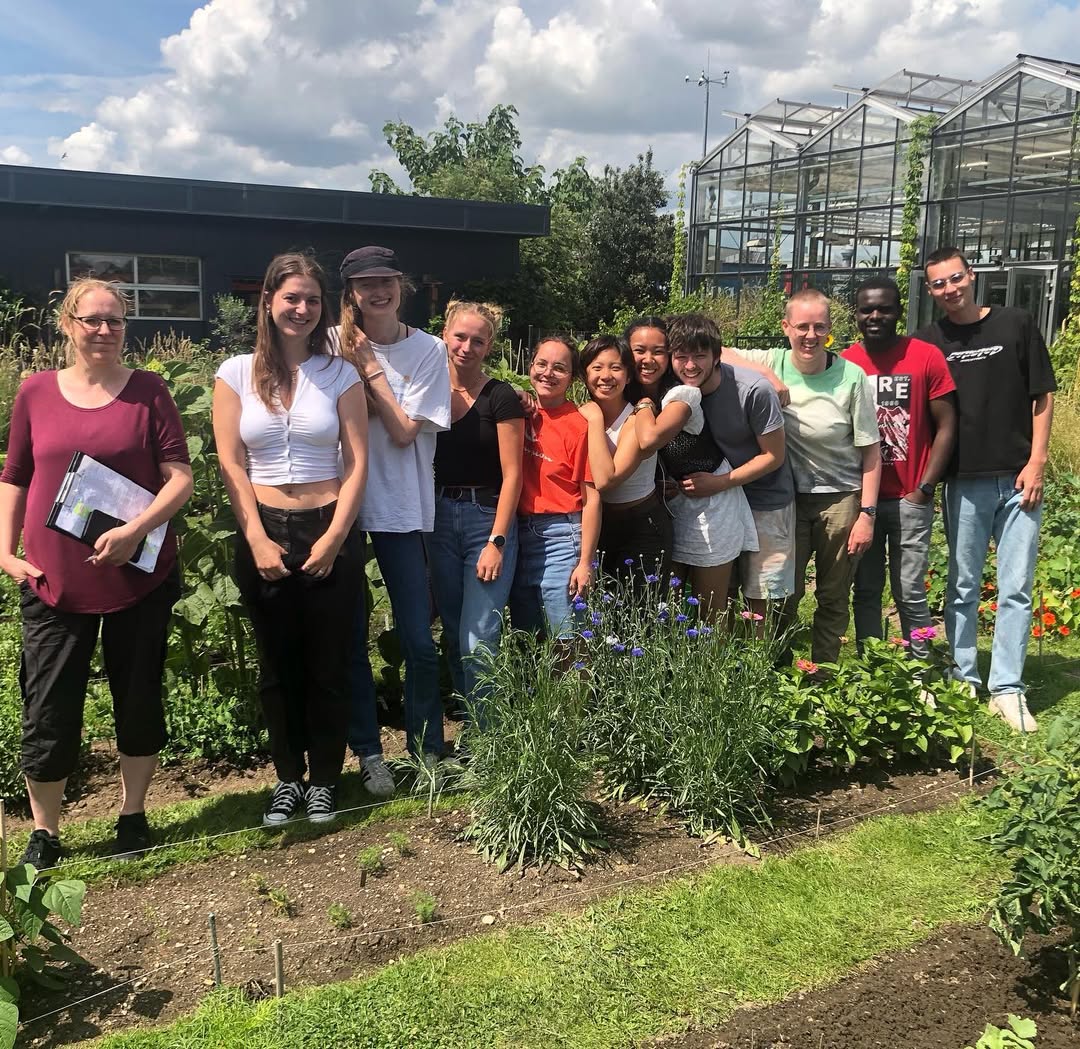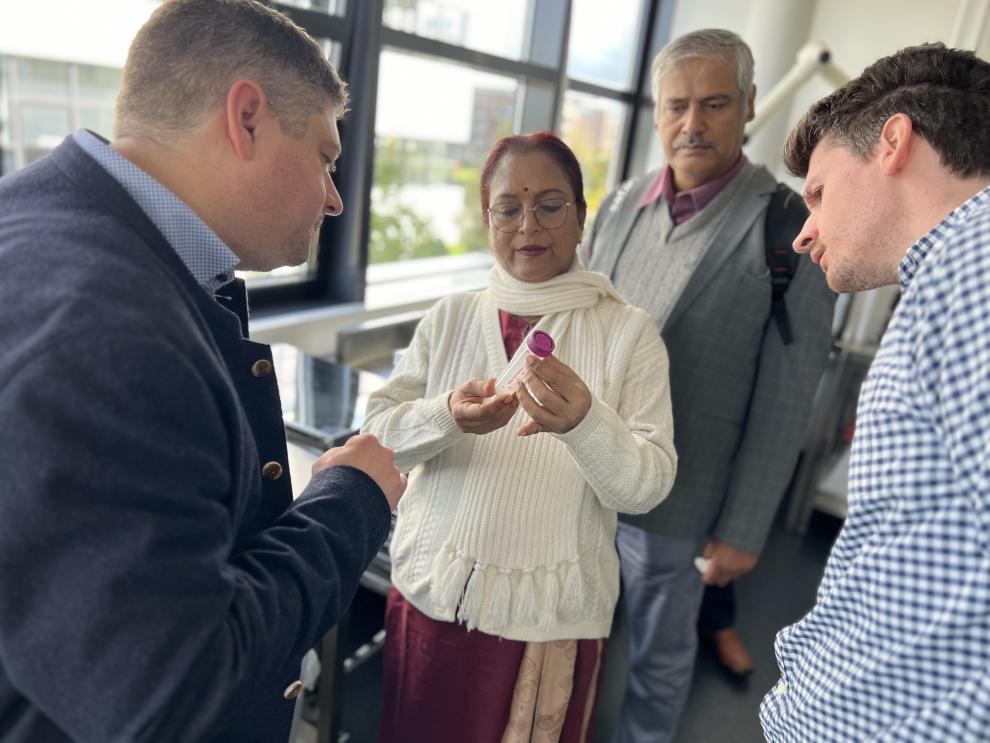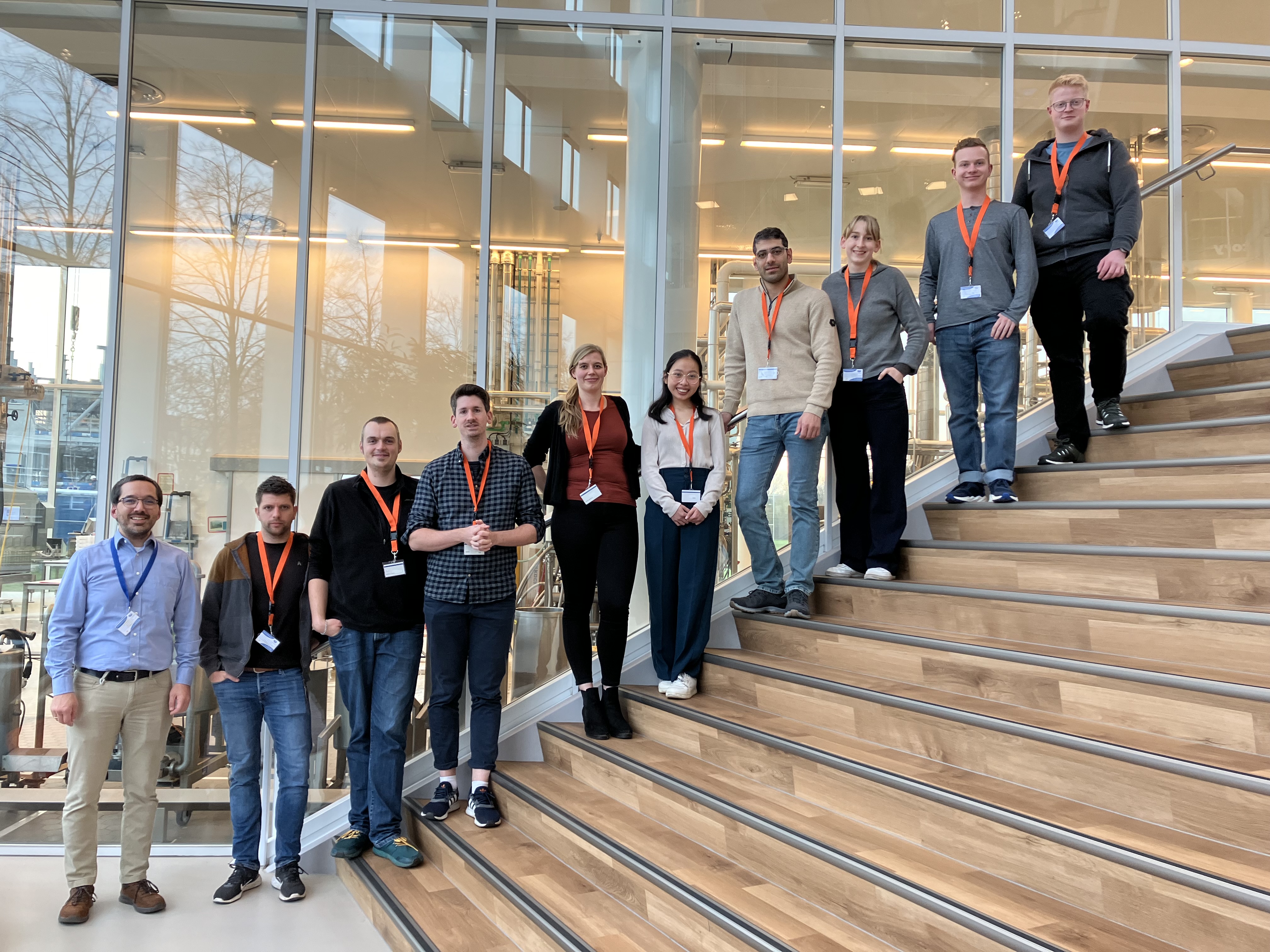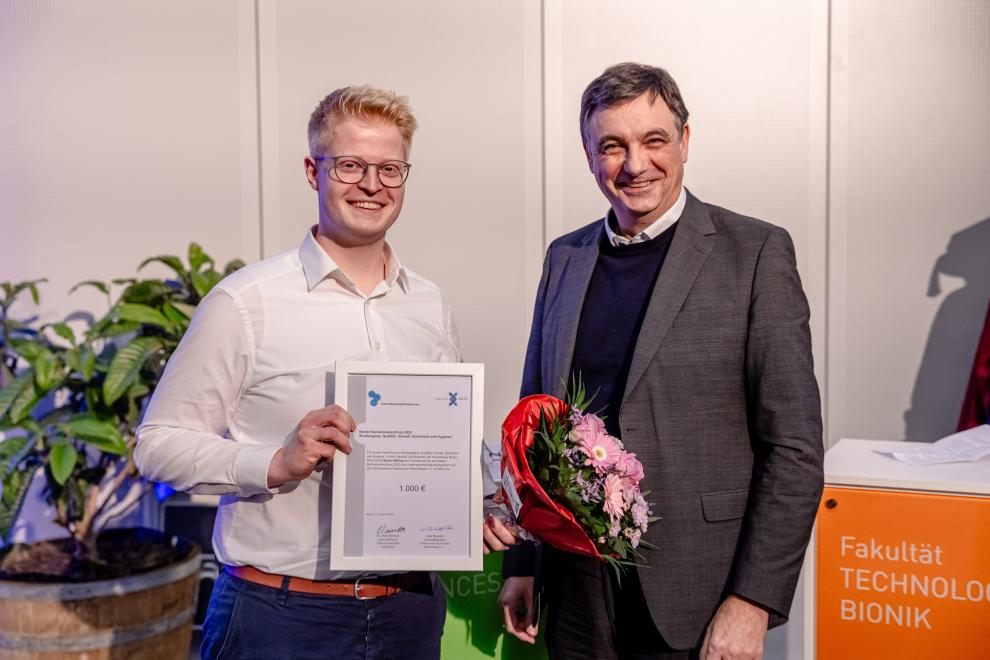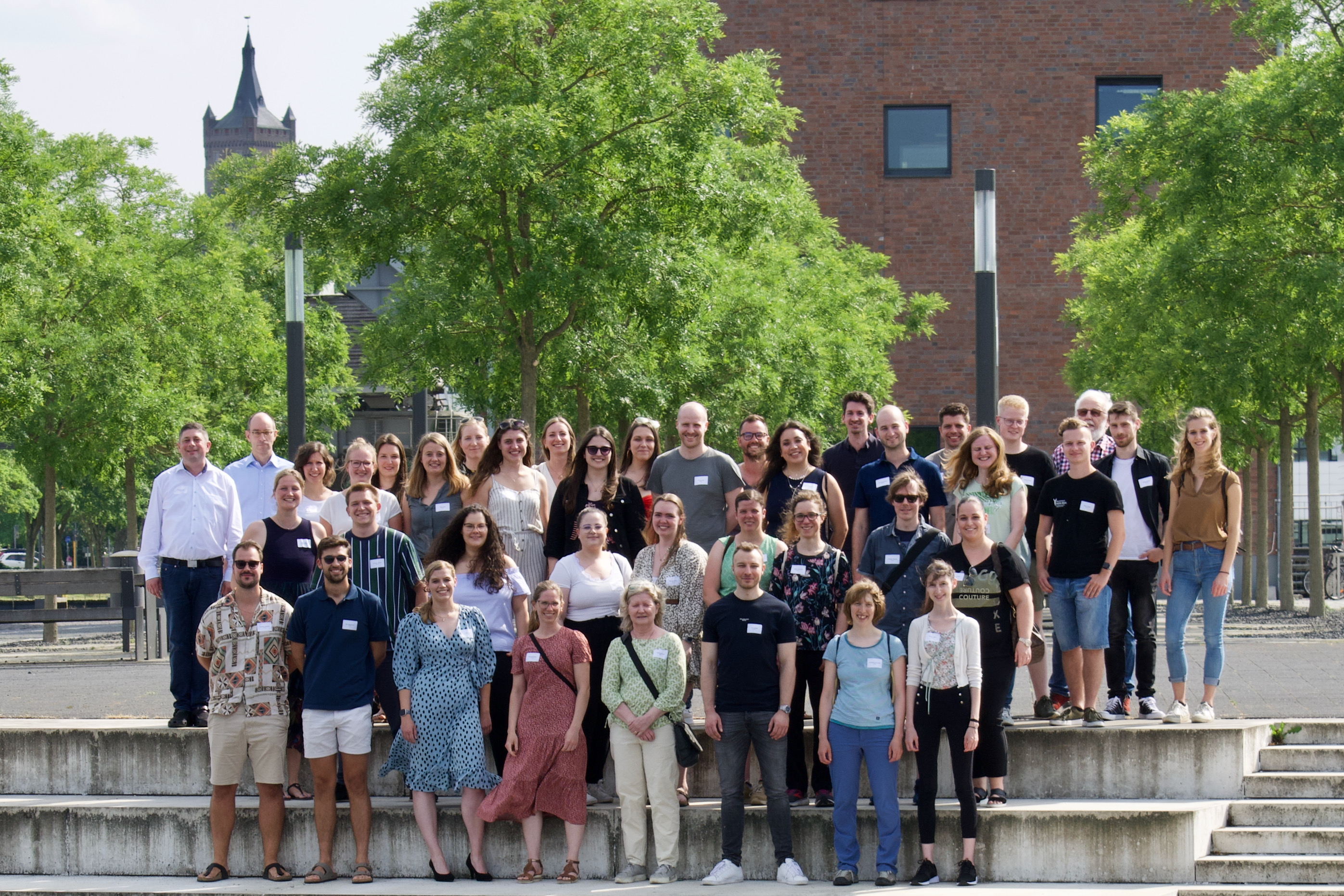Food Sciences*
"FROM FARM TO FORK" – "FROM FARM TO TABLE"
Hardly any other product group plays as significant a role in our daily lives as food and beverages. From the acquisition of raw materials of plant or animal origin to the processing and ultimately to the consumption of the final products by consumers, numerous different businesses and companies, as well as many other actors, are involved, operating at various levels of the value chain. In addition to the extraction of raw materials in agriculture, their processing and refinement in the food and beverage industry, this also includes the logistics and distribution of goods, including ensuring their quality and safety for consumers.
The master's program in Food Science views the various stages of food production and their complex integration into the entire value chain predominantly from a scientific perspective. Different viewpoints enable students to identify interconnections and thus develop an interdisciplinary and nuanced perspective on the product "food".
Special emphasis is placed on the interdisciplinary networking of the involved disciplines. Alongside imparting a scientific-technological understanding of the nature and production of food, aspects such as quality management, food safety, product development, sensory analysis, and nutritional physiology are also focused on, offering graduates a wide range of career opportunities.
Structure of the Study Program
In addition to providing a comprehensive and interdisciplinary perspective on relevant areas from biology, chemistry, agricultural and engineering sciences, coupled with issues from product development, sensory analysis, quality management, food safety, and nutritional physiology, the study program primarily focuses on practical training and learning a creative and application-oriented approach to problem-solving from the beginning. This experience is gained by the students, for instance, through a small-group applied research project. Finally, in the 3rd semester, the theoretically and practically acquired knowledge is applied and further deepened in the master's thesis, often conducted in cooperation with companies in the food industry.
Career Fields and Competencies
The Food Science program is explicitly designed for an interdisciplinary perspective. It enables a comprehensive assessment of various aspects concerning food and beverages, from the extraction of raw materials, through their further processing, to the requirements for the final products and their nutritional effects on consumers.
The trained graduates are particularly found where generalists with a broad knowledge and overview are needed. This is especially the case in companies in the food and beverage industry, but also in suppliers of, for example, flavors, natural colorants, and vitamins. Graduates, who have very good job prospects, can enter various areas of these companies, such as quality management, quality assurance, quality control, product development and research, sensory analysis, and scientifically based marketing of products requiring explanation.
Few goods are as important to us in our daily lives as food and drinks, and few goods are as complex to produce. Even the most common foodstuffs require a long and often global chain of production to go from field to plate: from the manufacturing, processing and refinement of raw materials to marketing, sales and the eventual consumption of the final product.
The Food Sciences M.Sc. programme focuses primarily on the study of this fascinating chain of production and its complex interactions within the context of the value chain. Through a variety of interdisciplinary approaches and perspectives you‘ll study foodstuffs not merely as consumable products, but rather within the sophisticated framework of the underlying, cross-disciplinary connections which form the production process. This leads to a broad expertise on the nature and production of foodstuffs not just from a technical point of view, but also in terms of quality assurance, nutrition, general product development and more.
From the very start, the degree programme places a strong emphasis on application-oriented research and methodology. In your first two semesters you‘ll focus on two semester-long projects which will provide many opportunities to apply your theoretical knowledge to interesting, real-world problems in food science. These research projects will also lay the groundwork for your master‘s thesis and subsequent colloquium in the 3rd semester, resulting in a sharply-defined specialisation and career profile after graduation.
* The degree programmes offered are suitable for part-time study in accordance with Section 62a (2) HG NRW.
Testimonials from graduates
Wíla Ferreira, M.Sc.
What knowledge and skills have you acquired through your degree programme that you can put to good use in your job today?
Firstly, I became more independent as a result of the Master's programme. For me, that was a big difference to studying in Brazil. Here you have to learn more on your own, look for information independently, ask questions, and contact with professors is not quite as regular.
And the second point is that I got to know many machines and processes very well during my studies. Previously in Brazil, I would have asked how to set something up or how to do something and then a professor or assistant would have shown me the solution by doing it themselves. It wasn't like that at Rhine-Waal University of Applied Sciences. Here, for example, we learnt about different machines and had to know exactly what their function was. And when you learn everything yourself and nobody does it for you, you get a different overview of how everything works. I didn't have that before. It's the same with processes at work. Nice colleagues also show you how it works, but usually there is only one document, a process description, and you have to read it yourself to know what you have to do.
What tips would you give to current and future students?
It is definitely helpful if you already have an idea of what you want to do afterwards when you start the Master's programme. Then you can also look at which companies and which subjects are particularly interesting for you right from the start. So know what you want and put your foot down during your studies. By this I mean, for example, doing additional research and learning more than just the knowledge taught in the lectures. What I have always done: Ask questions, be curious and show interest!
And finally, a tip for all international students who (want to) study the Master's programme in German: it is very important to learn the language as quickly as possible. The language makes it more of a challenge, but it's not impossible and we can get good jobs afterwards.
Dr. Jan Schages
Why did you choose the Master's degree programme in Food Science?
‘The decision was relatively easy. I entered a higher semester of the Bachelor's degree programme in Bio Science and Health because I had previously studied pharmacy. During my pharmacy studies, I was part of a working group that focussed on microbiology. I then realised that there was also a microbiology working group at Rhine-Waal University of Applied Sciences led by Professor Dirk Bockmühl. I started there as a student assistant and carried out research projects and my Bachelor's thesis. The Bachelor's degree programme was very generalist and practical, and that's exactly what I was hoping for from the Master's in Food Science. In addition to this broad education in the natural sciences, I wanted to acquire knowledge in food science, but at the same time also have the opportunity to continue working in Prof Bockmühl's working group and establish cross-links between microbiology and food science. That worked out well and I haven't regretted for a second that I did my Master's programme at Rhine-Waal University of Applied Sciences.’
What did you do professionally after graduating?
After my Master's thesis, I started as a research assistant in Prof Bockmühl's working group at Rhine-Waal University of Applied Sciences. I worked on industrial projects there and started my cooperative doctorate with the University of Bonn at the same time. So I spent the next three and a half years working in Kleve and doing my doctorate in Bonn, as Rhine-Waal University of Applied Sciences doesn't have the right to award doctorates of its own. Shortly before the end of my doctorate, when I had finished writing my thesis and was waiting for the date for the viva voce, I was approached by Henkel because of my educational background in microbiology and applied hygiene, as they already knew me from a joint project. That's how I ended up at Henkel, it was a smooth transition.
Tanja Pollmann, M.Sc.
How did you continue your career after graduation?
Right from the start, the modules were taught by professors or people who have also worked in industry. This gave you a good insight into what is possible and whether you could imagine doing it yourself. In the first semester, ‘Quality and Safety’ was the module that appealed to me the most. I realised quite early on that I would like to work in quality management. Professor Kugler put me in touch with NB Manufaktur and I completed my internship there in the third semester and wrote my Master's thesis. I was then taken on by the company.
What knowledge have you acquired through your studies that you can use well in your job today?
I recently realised again that the knowledge we were taught during our studies was very practical. We did part of the ‘Development and Sensor Technology’ module in our company this semester, so the students came to us on three occasions. When I looked at my old product development documents for this, I realised once again that there is a lot in there that we actually do in practice here every day.
The ‘Microbiology’ module that we had in the Master's programme also helped me a lot. In this module, we looked at different groups of raw materials and that gave me a good feel for what is important for which product groups in my job. Delicatessen is a very complex product from a microbiological point of view because it contains many different raw materials with different requirements as ingredients.
Julius Itta, M.Sc.
What was the topic of your Master's thesis?
My Master's thesis was about analysing and avoiding process-related consistency fluctuations in the production of jams. It was very practical work that had a direct impact on the quality of the end products. During this time, I worked alongside my thesis in the normal day-to-day business within QA and was also able to gain insights into other departments, such as production, packaging and logistics. I also had my first contact with external audits there. Not as the person in charge, of course, but at least I was able to get a good idea of how things work.
What did you do professionally after graduating?
Basically, there are many job opportunities available with a degree in food science, but I found it a bit difficult to find a job. Perhaps I had too high expectations as a young professional and wanted to find the perfect job straight away.
I had several job interviews, sometimes I turned them down, sometimes the company turned me down, until I ended up at Löwensenf, a mustard producer in Düsseldorf. I started there in 2017, initially in the laboratory in the analytics department, and for a good four and a half years now I've been Head of Quality Assurance.
What three words would you use to describe Rhine-Waal University of Applied Sciences?
Practical relevance, opportunities and diversity.
Quicklinks
Information
Place of study
Campus Kleve
Start date
Winter or summer semester
Language
German
Duration of study
3 semesters of full-time studies
Study model
Full-time or part-time degree programme
Degree awarded
Master of Science
Restricted admission
No
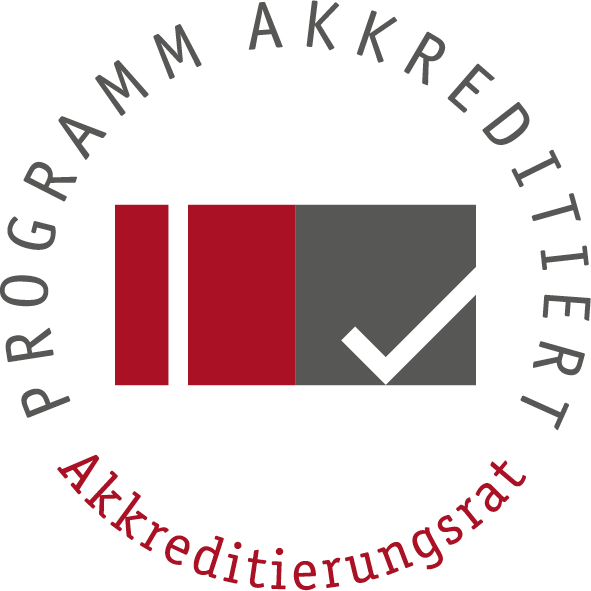
General Academic Advising
Tel.: 02821 - 806 73 - 360
E-mail: Academic Advising
Specialized Academic Advising
Program Director
Tel.: (02821) 806 73 - 239
E-mail: Florian Kugler
News from the Program
Your studies at the Faculty of Life Sciences Kleve: Application open for winter semester 2025/26.
The application window for the winter semester 2025/26 at the Faculty of Life Sciences right here in Kleve is now open! We have super exciting and practical Bachelor's and Master's degree programs for you – in German and English – that will prepare you for everything that is important in the Life Sciences. And check this out: For some degree programs without admission restrictions, you even have until August 31, 2025, to apply! Read more.
IIT Kharagpur and Rhine-Waal University of Applied Sciences Renew Collaboration
A high-ranking delegation from the renowned Indian Institute of Technology (IIT) Kharagpur, one of India's leading technical universities, visited Rhine-Waal University of Applied Sciences and the Food Technology Lab in Kleve. The goal of the visit was to renew the Memorandum of Understanding (MoU), a written declaration of intent that forms the basis for collaboration between the two institutions, defining joint goals and responsibilities, and serving as a starting point for future cooperation. The focus of the exchange was joint projects in research and teaching as well as the establishment of new initiatives at the master’s and doctoral levels. This exchange highlights the mutual interest of both universities in international networking and the exchange of knowledge and research. Read more.
Master’s in Food Science Visits DANONE NUTRICIA RESEARCH in Utrecht
Students of the Master’s Program in Food Science had the opportunity to gain exciting insights into the cutting-edge Danone Research Center in Utrecht, a location that focuses particularly on early childhood and medical nutrition research and product development. Read more.
Martin Willing, Top Bachelor Graduate and Master’s Student at Rhine-Waal University
Martin Willing (left in the picture), a chef and award-winning graduate of the Bachelor’s program in Quality, Environment, Safety, and Hygiene (QUSH) at Rhine-Waal University of Applied Sciences, is now enrolled in the Master’s program in Food Science. Despite his success in the culinary field, he deliberately chose to switch to the academic world. For his outstanding bachelor’s thesis on the impact of glucose syrup coloration on gummy candy, he was awarded the prize for the top QUSH graduate of his class by the Rhine-Waal University of Applied Sciences Support Association and the Niederrhein Employers' Association, represented by Dr. Ralf Wimmer (right in the picture). Read more.
Master’s Students in Food Science Produce “Rosé Wine from the Lower Rhine”
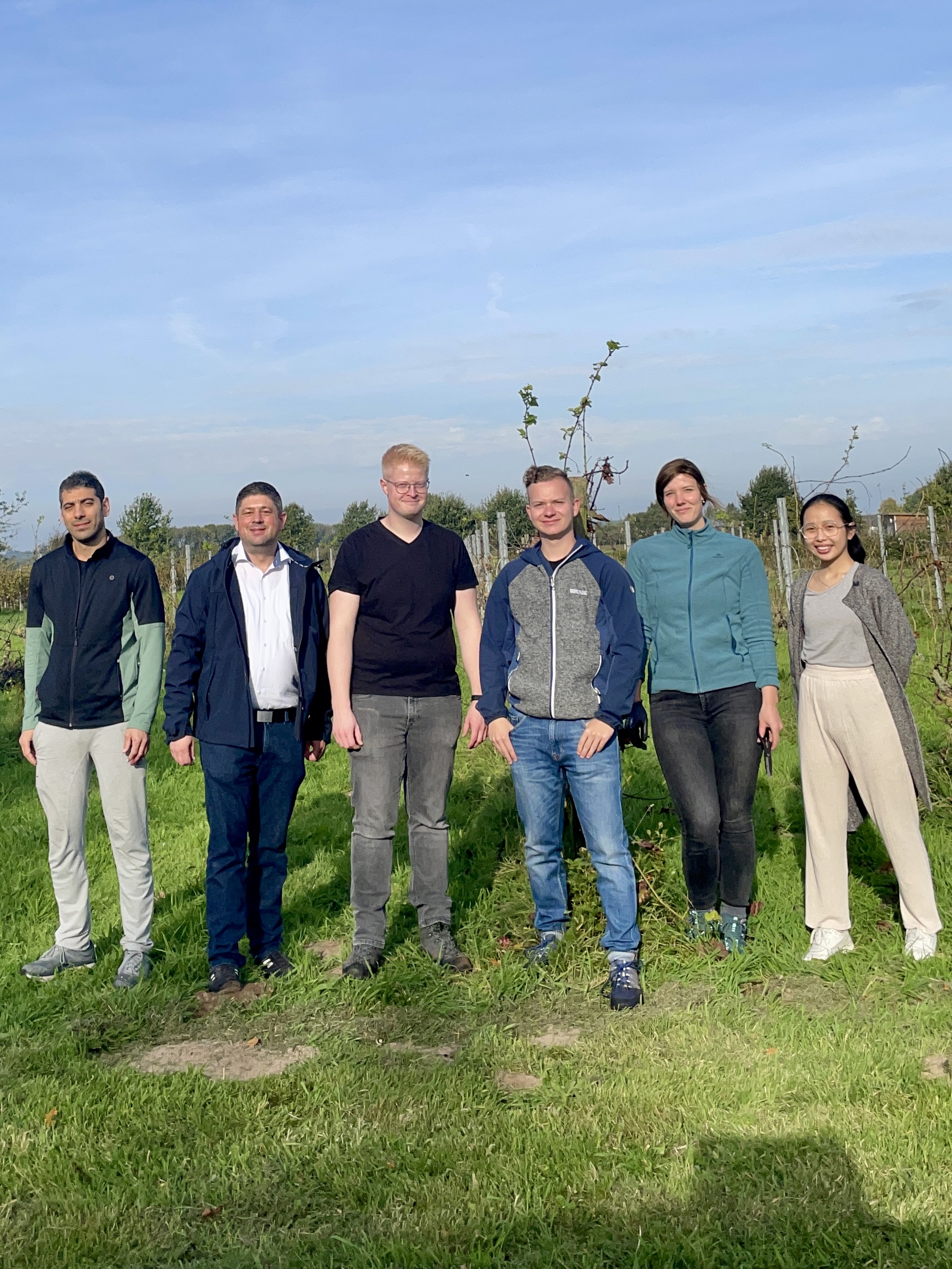 Master’s students from the Food Science program produced a rosé wine from grapes donated by a Dutch vineyard for their research project. Despite the low sugar content, they succeeded in making a wine of acceptable quality, experimenting with various methods and storage conditions. The project highlights the practical training and regional connection of the program. Next, the aspiring food scientists plan to produce a brandy from the leftover grapes. Read more.
Master’s students from the Food Science program produced a rosé wine from grapes donated by a Dutch vineyard for their research project. Despite the low sugar content, they succeeded in making a wine of acceptable quality, experimenting with various methods and storage conditions. The project highlights the practical training and regional connection of the program. Next, the aspiring food scientists plan to produce a brandy from the leftover grapes. Read more.
10 Years of the Master’s in Food Science at the Faculty of Life Sciences!
As students prepare to begin their studies at our faculty, we’d like to offer a glimpse into what lies ahead after graduation. On June 23, 2023, a special event marked the journey of many students: the 10-year anniversary of the Master’s in Food Science. Read more.

